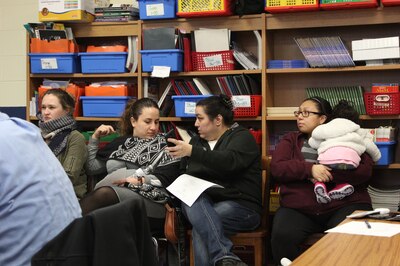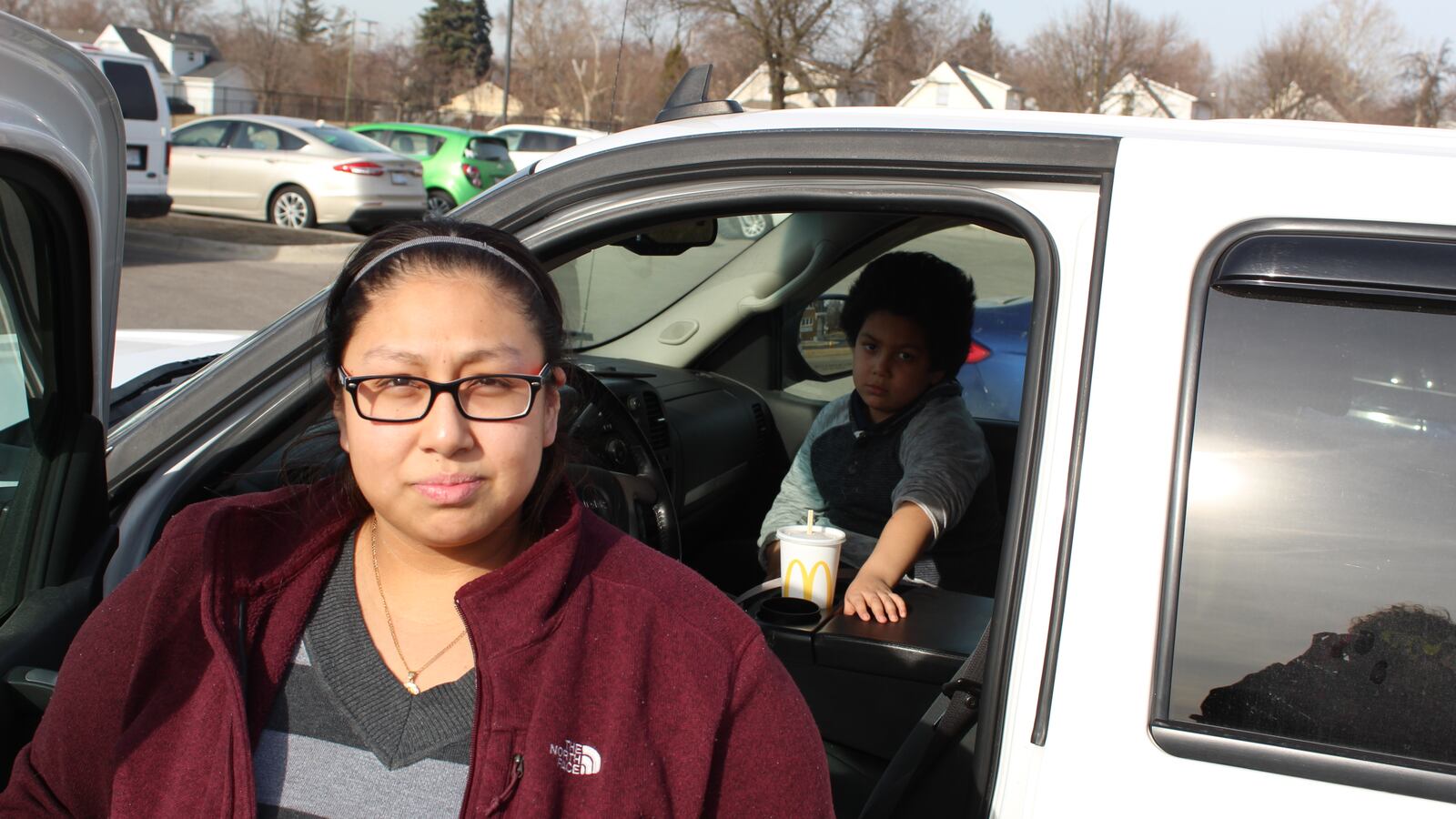Para leer esta historia en español, oprima aquí.
Michelle Villa’s mind was made up. She would finally pull her kids out of the Southwest Detroit Community School, the tiny charter school her older son Anthony has attended since it opened with help from tennis star Andre Agassi in 2013.
Villa was committed to the school from very beginning, when she donned a hard hat to tour the building with other prospective parents. She kept her children enrolled as five principals — almost one per year — tried and failed to contend with relentless teacher turnover and poor academic results.
But when she pulled her white pickup truck into the parking lot for another board meeting last week, she wasn’t interested in the latest turnaround plans. She was thinking about the reasons why her younger son’s third-grade classroom had already lost two teachers this year.
“As a parent, it’s alarming,” Villa said. “I’m making sure my child is at school every day, and I’m hoping that he’s learning something. But he’s not.”
Villa isn’t the only one who is deeply dissatisfied with Southwest Detroit Community School. Placed on a state watchlist last year because of poor test scores, the school brought in yet another batch of school leaders. But the promised improvements haven’t materialized, and trust between teachers and the administration has disintegrated. As the school’s leaders prepare for yet another reboot, Villa isn’t the only parent planning to leave, leading some in the community to think that the school is on the verge of collapse.
“With these key parents leaving, I don’t know what the future is going to hold,” said a former teacher who spoke on the condition of anonymity to protect their future job prospects. “The one thing that has been consistent at that school is the amazing community.”
The situation has many of the same ingredients that led to the abrupt closure of another Detroit charter school, Delta Preparatory Academy for Social Justice, in September. It speaks to the challenges of providing a quality education in a city where oversight is fragmented, enrollment is hard to predict, and schools often lack the additional resources they need to educate at-risk kids.
Like Delta Prep, Southwest Detroit Community School was part of a wave of new schools that opened after Michigan’s cap on charter schools was lifted in 2011. Both were supported by respected Detroiters who sought to give families a fresh start as the city’s main district hurtled towards bankruptcy.
Both schools opened in neighborhoods that already had enough classroom seats, and both struggled to enroll enough students to pay the bills. At this time last year, the Delta Prep school board was gearing up for another effort to turn around the school. Instead, enrollment cratered, the school shut down, and nearly 200 families were sent scrambling to find a new school.
If Villa and other families depart, Southwest Detroit Community School could easily follow the same trajectory. Despite a relatively new building that was funded in part by Agassi, enrollment was down this year, and a further decline could devastate the already lean budget.
For now, though, the school board is once again wagering that new management will boost test scores and help attract enough students to keep the doors open.
In fact, school officials say, 88 percent of parents have indicated that they will return next year. But that figure includes Villa and several other parents who told Chalkbeat they are not returning. They say they submitted the re-enrollment paperwork because the school promised students pizza if their parents said they were returning.
Villa, now a Head Start teacher, was raised by Mexican immigrants in Detroit. She was the first in her family to attend college, and she’s determined that her children will get degrees, too. She knew some of the first teachers to be hired at the school, and they sold her on the idea of a school that valued parent voices.
“We were going to be a part of the school,” she said.
Since then, her family has outlasted several school administrations. Lighthouse Academies, the Florida-based management company that helped open the school, departed after three years, leaving the school in precarious financial position.
When a former teacher was hired as the school’s fourth principal, he found that it lacked almost any of the systems that support student learning. Without consistent leadership, teachers were “winging it,” he told Chalkbeat last year, using whatever curriculum and lesson plans they could cobble together.
Last year, Villa and dozens of other parents backed an effort by the school’s 30 mostly inexperienced teachers to form a union, arguing that better conditions for the teachers would mean less turnover and more stability for the school.
That victory was short-lived, as parent and teacher morale worsened this year and relationships with school leaders became increasingly antagonistic.
At least three teachers quit, including a leader of the union. The school still hasn’t found certified teachers to replace them, angering parents.
“This school is battle after battle after battle,” said Mariana Hernandez, another parent who now says she’s leaving. “At some point it’s just beyond me.”
An internal survey of teachers, obtained by Chalkbeat, revealed a deep rift between administrators and teachers. Just 4 percent of respondents agreed that “administrators and staff communicate effectively,” while only 7 percent agreed that the school environment is characterized by “respect, teamwork, and accountability,” according to the survey, which is dated January 15.
“Teachers are feeling really discouraged,” said Jen Bahn, a veteran math teacher who is chair of the school’s union, in an email. “We have been trying to support and advocate for our students but we don’t feel like we are being heard.”
Partway through the school board meeting last week, Villa’s husband, a house painter, got off work. He stopped by the school to pick up their three children, freeing Villa to listen as administrators painted an optimistic picture of the school’s future.
“What we’re doing is working,” said Kim Pritchett, the school’s fifth principal since 2013.
Internal tests show that students are making progress towards the goals laid out in the school’s state improvement plan, she said, though she acknowledged that the school isn’t on track to produce the major improvements required by the state.
She attributed the uptick in student test scores to a system of rewards she has implemented around standardized tests. The theory — a controversial one in education, and one that research doesn’t consistently support— is that highly motivated test-takers post higher scores.
“They know they have to meet their target scores, and then they’ll have a chance to get a free hoodie, or a movie with the principal,” Pritchett said. “We’re trying to think outside the box. Once a kid feels encouraged, they’ll bend over backwards for you.”
It’s not enough for the school’s board, which is planning to replace EAS Schools, the management company that is finishing its third year in charge of the school. The board has hired a consultant to help them transition to a new management model.

For Villa, the decision to change managers was the last straw. The move came with little in the way of specific explanation, and she felt parent voices hadn’t been taken into account.
Teachers, meanwhile, say they suspect that the change in management company is meant to undercut the contract deal they made with EAS.
Nate Walker, a policy analyst for the American Federation of Teachers in Michigan who is advising the teachers, said the school is borrowing tactics that have been used to undermine unions at other charter schools, including University Yes and Voyageur Academy.
Because charter school teachers are typically employed by management companies, not the charter school board, a board can reset teachers’ contracts by changing companies. That can send a union campaign back to square one.
“In all of these situations, there’s a sad theme,” Walker said. “The operator and the board and the authorizers are willing to further disrupt and destabilize the school community solely because they don’t want to collaborate with the educators in those schools.”
Rob Kimball, head of the charter office at Grand Valley State University, which oversees the school, declined to comment and referred Chalkbeat to Sophia Chue, president of the school board.
Chue said the goal is to help the school meet the requirements laid out in its state improvement plan. “We’re a turnaround school,” she said. In a text message, she added that “the collective bargaining agreement with the union is in place and we will continue to follow this agreement.”
But those assurances haven’t been communicated to teachers, many of whom fear for their jobs, Bahns said. Their contract is with EAS, so they will have to be re-hired once the board picks a new manager.
“The school has made no commitment to have anyone back, we are all laid off at the end of the year,” she said. “It makes sense for folks to start the job search.”
The school’s current manager, Heather Gardner, said the school would be thrown into chaos if the union dissolved. Her contract with the school ends on June 30. She, too, declined to say why it was terminated.
“If something is done where the union is not recognized on a going-forward basis, that would start a tremendous upheaval with the staff, and that would not be a good thing,” she said.
Villa, who supported the union, says she’s not optimistic enough about a turnaround to keep her children enrolled. But until they’re enrolled somewhere else, she said she won’t give up on the school.
“As long as my kids are at the school, I’m going to keep coming to meetings and keep fighting,” Villa said.

